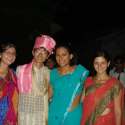PorColombia President on the VI Student/Professional Conference at Cornell University
Carlos Macias is a Baruch graduate in Journalism and History. Last year, Macias was elected president of the PorColombia National group. In an interview with him we discussed general aspects relevant to the VI Student/Professional Conference the organization will be holding at Cornell University next month.
What makes this year’s conference at Cornell so special?
This year marks the sixth installment of our annual signature event. This conference brings 14 speakers, 3 Panels, 6 workshops, the exclusive & avante-garde art exhibition of Edwin Gil “Quilting Differences: Blending Art & Social Media”, and of course, Colombian rumba.
How can people who do not have a Colombian background benefit from attending this event or future conferences? What could be of interest to them?
This conference brings a wide view of how Colombia interacts in the hemisphere as a key economic player, it will show how we have used urban planning and architecture to address social inequality in Colombia and how these examples can be used elsewhere. Also, our 4 pillars: cultural, social, academic, philanthropic help us provide an experience where our members sharpen their entrepreneurial, networking and leadership skills. These are some of the reasons why in our national board we have people from other Latin American countries like Perú and Ecuador.
How does the topic(s) of this year’s conference relate to any international business/cultural issues?
This year’s topic “Construyendo País” is particularly relevant with international business and hemispheric culture. We navigate between two worlds. One, we are an integral part of the American society and we contribute to its progress. At the same time, we keep deep and constant connections with our homeland. This duality makes us very aware of the potential of our commercial relations in the Americas giving us a professional edge thanks to our cultural intelligence.
What is a good example of an impact created by a PC conference? Does it go beyond being an informational forum? What usually happens after the conference is over?
The conference serves several purposes: Strengthen our growing organization and networking, create a forum for thoughtful discussion and debate, and cement our foundations to keep attracting the best talent from universities across the U.S. and Canada. Once the conference is over, we use these connections to keep growing and create a sense of community. The event also shows potential recruiters, the quality of the people in PorColombia and generates many job opportunities. We have several stories of people getting jobs and internships thanks to our networking.



